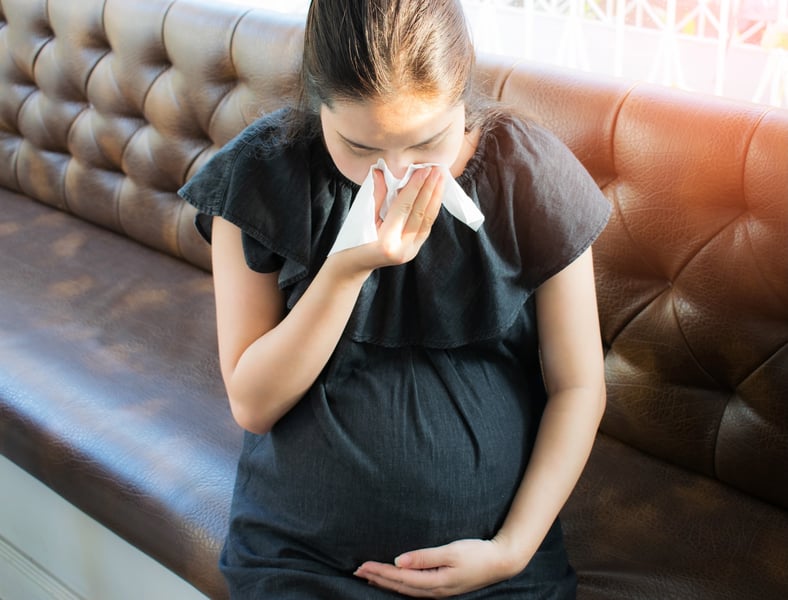Get Healthy!

- Posted March 28, 2023
Don't Let Allergies Get Out of Hand During Pregnancy
Pregnancy should be a special time, but allergies can make you miserable.
It is estimated that up to 20% of pregnant women suffer with allergies.
In some cases, women may notice that their allergy symptoms become even more troublesome during pregnancy. This may be due to hormonal changes. Interestingly, some women's allergies stay the same or even disappear while pregnant.
It is even more important during pregnancy to use appropriate allergen avoidance measures depending on the cause of your allergies, as this is safest approach to management.
If you have fall or spring hay fever problems, make sure you always keep the windows to your house and car closed so that pollen does not come in. If house dust mites cause your allergies, using mite-proof encasings on the mattress and pillows and removing carpet from your bedroom may help. For pregnant women with pet allergy, removing the pet from the house, or at least the bedroom, can improve allergy symptoms.
The most common question asked by pregnant patients with allergies is, "What medications can I safely use during my pregnancy?"Treatment should begin with saline nasal spray and humidifiers to try to relieve nasal symptoms.
The American College of Allergy, Asthma and Immunology says that, ideally, it is best to avoid any medication use if possible. Consult your allergist before you stop any current medication and before starting a medicine during pregnancy, including over-the-counter (OTC) treatments.
There are medicines that may be recommended to you by your health care provider that are generally considered safe. The most safety data have been gathered with first-generation oral antihistamines. These medications have not shown any fetal risk during pregnancy. Examples of first-generation antihistamines are brompheniramine (Dimetapp), chlorpheniramine (Chlor-Trimeton), and diphenhydramine (Benadryl). It is important to note that these first-generation antihistamines can have side effects like drowsiness and dry mouth.
Other agents that also appear safe during pregnancy but have less scientific data than the first-generation antihistamines are the second-generation oral antihistamines, such as cetirizine (Zyrtec) and loratadine (Claritin), and the intranasal corticosteroids, fluticasone (Flonase) and mometasone (Asmenax). The second-generation oral antihistamines have the advantage of not having the side effects seen with the first-generation ones.
It is better to avoid oral decongestants like pseudoephedrine (Sudafed) during the first trimester, as some studies suggest that they may slightly increase the risk of abdominal wall birth defects. These treatments are generally safe during the remainder of the pregnancy if you don't have high blood pressure.
You may wonder about allergy immunotherapy shots, drops or tablets for desensitization while you are pregnant. Allergy immunotherapy in general should not be started during pregnancy. For most women, it is safe to continue that treatment if it was already started prior to getting pregnant. Since everyone is different, you should discuss with your allergist whether continuing is right for you and whether your allergy immunotherapy schedule should be modified.
Some women will develop "allergies"for the first time during pregnancy, but in most cases, they have a condition called "rhinitis of pregnancy."This disorder is not a true allergy like hay fever, but is believed to be due to hormonal changes. It causes severe nasal congestion, making it difficult to breathe through the nose. It can make you especially uncomfortable when you are lying down.
Unfortunately, the typical allergy medicines that have been found safe to use during pregnancy don't usually improve nasal blockage. Some women find using a humidifier and/or a saline nasal spray to be helpful. An OTC nasal strip is safe to use and can help open the nasal passageways.
The good news is that rhinitis of pregnancy will go away within a few weeks of the birth of your child but, unfortunately, usually returns with each pregnancy.
As you can see, nasal problems can affect your pregnancy. It is important that you work with your physician and allergist to control them effectively and safely for you and your unborn child.







